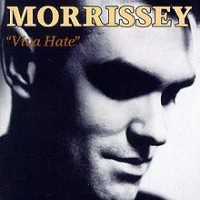Within six months of the Smiths' breakup and only three months after the posthumous release of the swan song Strangeways, Here We Come, Morrissey was back in the studio with former Smiths producer Stephen Street behind the boards, and new songwriting partner Vini Reilly of the Durutti Column stepping into the large shoes of guitar god Johnny Marr. Right from the get-go, the distorted guitar wail and pulsating beat of "Alsatian Cousin" should make it readily apparent to the listener that Reilly is not trying to replace Marr, nor are Morrissey and Street trying in any way to recreate the Smiths' sound. That is not to say, however, that Viva Hate has nothing to offer your diehard Smiths fans. The album's two singles, "Suedehead" and "Every Day Is Like Sunday" are classic mopers which can hold their own against any Morrissey-Marr composition, and remain to this day two of his most loved and iconic songs. While he is not known particularly for his humor or for writing light-hearted songs, he proved himself more than capable of both back in the Smiths with songs like "Ask" and "Sheila Take a Bow"; the U.S.-only bonus track "Hairdresser on Fire" is, like the aforementioned Smiths songs, at times empathetic, vain, and laugh-out-loud funny. Oh, and catchy as fuck.
There are a few songs on Viva Hate that, maybe just by coincidence, do sound like classic Morrissey, Marr, Rourke, and Joyce. The Mozfather's pointed wit and trademark targeting of public officials we grew to love on The Queen Is Dead is here tenfold in "Margaret on the Guillotine". Two songs in particular, "I Don't Mind If You Forget Me" and "Break Up the Family", the latter with lyrics like "I'm so glad to grow older / to move away from these younger years," address the Smiths breakup less than subtly. "I Don't Mind" is a rolling, rollicking tune reminiscent of "London", and Reilly's constant shredding adds a nice touch, while "Break Up" is a softer, mid-tempo track that recalls some of the slower tracks on the Smiths' 1984 self-titled debut.
It is lamentable that so many say they "love the Smiths but could never get into Morrissey's solo stuff," and that they "don't know where to start." I hope with this review, I can convince even the most skeptical Smiths fan that it is as easy as starting from the very beginning, with Viva Hate.
